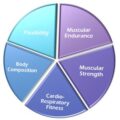Physical fitness plays a crucial role in enhancing student academic performance and mental well-being. It is not just about staying physically healthy; it has a direct impact on the overall growth and development of an individual.
In this article, we will explore the importance of physical fitness for students and the significant connection it has with their academic performance and mental well-being.
The Importance of Physical Fitness for Students
Regular physical activity is essential for students as it helps improve their overall physical health, strengthens their immune system, and reduces the risk of chronic diseases. Engaging in physical fitness activities also promotes better sleep patterns, enhances concentration and focus, and boosts self-confidence among students. For detailed essays on this topic, students might consider resources like domyessay.com for assistance and further information.
The Connection between Physical Fitness, Academic Performance, and Mental Well-being
There is a strong correlation between physical fitness, academic performance, and mental well-being. Engaging in regular physical activity improves blood circulation to the brain, leading to increased cognitive function, memory retention, and better information processing. Exercise also triggers the release of endorphins, which helps reduce stress, anxiety, and depression, ultimately enhancing students’ mental well-being.
By incorporating physical fitness into their daily routine, students can not only improve their academic performance but also experience a positive impact on their mental well-being. It is crucial for educational institutions and parents to emphasize the importance of physical fitness in order to support the holistic growth and development of students.
Physical Fitness and Cognitive Functioning
How physical fitness enhances cognitive function
Physical fitness plays a vital role in enhancing cognitive function among students. Regular exercise increases blood flow to the brain, improving its oxygenation and nutrient supply. This increased blood flow helps stimulate the release of growth factors, which have a positive impact on brain cell development and function. As a result, students who engage in physical fitness activities often experience enhanced problem-solving skills, improved decision-making abilities, and increased creativity.
The impact of physical activity on memory and concentration
Engaging in physical activity has been shown to have a significant impact on memory and concentration. Exercise promotes the production of neurochemicals, which facilitate better communication between brain cells. This improved brain communication translates into enhanced memory retention and better concentration levels among students. Additionally, physical activity increases the production of neurotransmitters like dopamine and serotonin, which are responsible for regulating mood and enhancing focus.
By incorporating physical fitness into their daily routine, students can boost their cognitive functioning, memory, and concentration abilities. It is important for educational institutions and parents to encourage regular physical activity to support students’ academic performance and mental well-being.
Physical Fitness and Academic Achievement
The correlation between physical fitness and academic performance
Research has shown a strong correlation between physical activity and academic performance among students. Engaging in regular physical activity has been found to have a positive impact on various cognitive functions, including memory, attention, and problem-solving skills. Students who are physically fit tend to perform better academically compared to their less active peers. The increased blood flow to the brain during exercise enhances the oxygen supply and nutrient delivery, promoting optimal brain function and improving cognitive abilities.
The role of physical activity in improving grades
Physical activity not only benefits students’ physical health but also plays a significant role in improving their academic performance. Regular exercise has been found to improve memory retention and concentration, making it easier for students to absorb and retain information. Additionally, physical activity helps reduce stress levels, improve mood, and increase motivation and self-confidence, all of which contribute to better focus and academic achievement.
By prioritizing physical fitness and incorporating regular exercise into their routine, students can enhance their academic performance and overall well-being. Educational institutions and parents should recognize the importance of physical activity in supporting students’ cognitive development and create opportunities for them to engage in various fitness activities.
Physical Fitness and Mental Well-being
The positive effects of physical fitness on mental health
Physical fitness not only contributes to improved academic performance but also plays a crucial role in enhancing students’ mental well-being. Engaging in regular exercise has been found to have positive effects on mental health, reducing symptoms of anxiety and depression. Exercise releases endorphins, also known as “feel-good” hormones, which help elevate mood and promote a sense of overall well-being. Additionally, physical activity can improve sleep quality, increase self-esteem, and boost self-confidence, all of which are essential for maintaining good mental health.
The relationship between exercise and stress reduction
Regular physical activity has been shown to be an effective stress management tool for students. Exercise helps alleviate stress by triggering the release of neurotransmitters like serotonin, which improve mood and reduce feelings of tension and stress. Engaging in physical activity also provides a distraction from academic pressures and creates a sense of relaxation and rejuvenation. By incorporating exercise into their routine, students can effectively manage stress levels, leading to better mental well-being and improved academic performance.
Physical Fitness and Self-esteem
Improving self-esteem through physical activity
Regular physical fitness has a significant impact on enhancing students’ self-esteem. Engaging in exercise not only promotes physical well-being but also contributes to a positive self-perception. When students take part in physical activities, they develop a sense of accomplishment and satisfaction, which boosts their self-esteem. Meeting fitness goals, overcoming challenges, and improving performance all play a role in building confidence and a positive self-image.
The connection between physical fitness and body image
Physical fitness also plays a vital role in shaping students’ body image and overall self-esteem. Regular exercise helps individuals feel more connected to their bodies and appreciate their physical capabilities. Through physical activity, students can develop a healthier body image, focusing on strength, endurance, and overall wellness rather than societal standards of beauty. This positive mindset towards their bodies contributes to increased self-esteem and mental well-being.
By prioritizing physical fitness and engaging in regular exercise, students can experience improvements in both their academic performance and mental well-being. Physical activity not only improves physical health but also enhances self-esteem, body image, and overall mental well-being.
Conclusion
Recognizing the importance of physical fitness in student academic performance and mental well-being
Regular physical fitness not only improves students’ physical health but also has a significant impact on their academic performance and mental well-being. Engaging in regular exercise helps students stay focused, improves their cognitive function, and enhances their ability to learn and retain information. Physical activity also reduces stress and anxiety, providing students with a better overall mental state and well-being. Understanding the importance of physical fitness in these aspects is crucial for the holistic development of students.
Recommendations for further research and action
To further explore the role of physical fitness in enhancing student academic performance and mental well-being, it is recommended that educational institutions invest in comprehensive physical education programs. These programs should not only focus on physical activity but also incorporate strategies for promoting mental health and well-being. Additionally, conducting research studies to assess the impact of physical fitness on academic achievement and mental health can provide valuable insights for educators and policymakers. By prioritizing physical fitness and mental well-being, educational institutions can create an environment that fosters student success and overall well-being.





